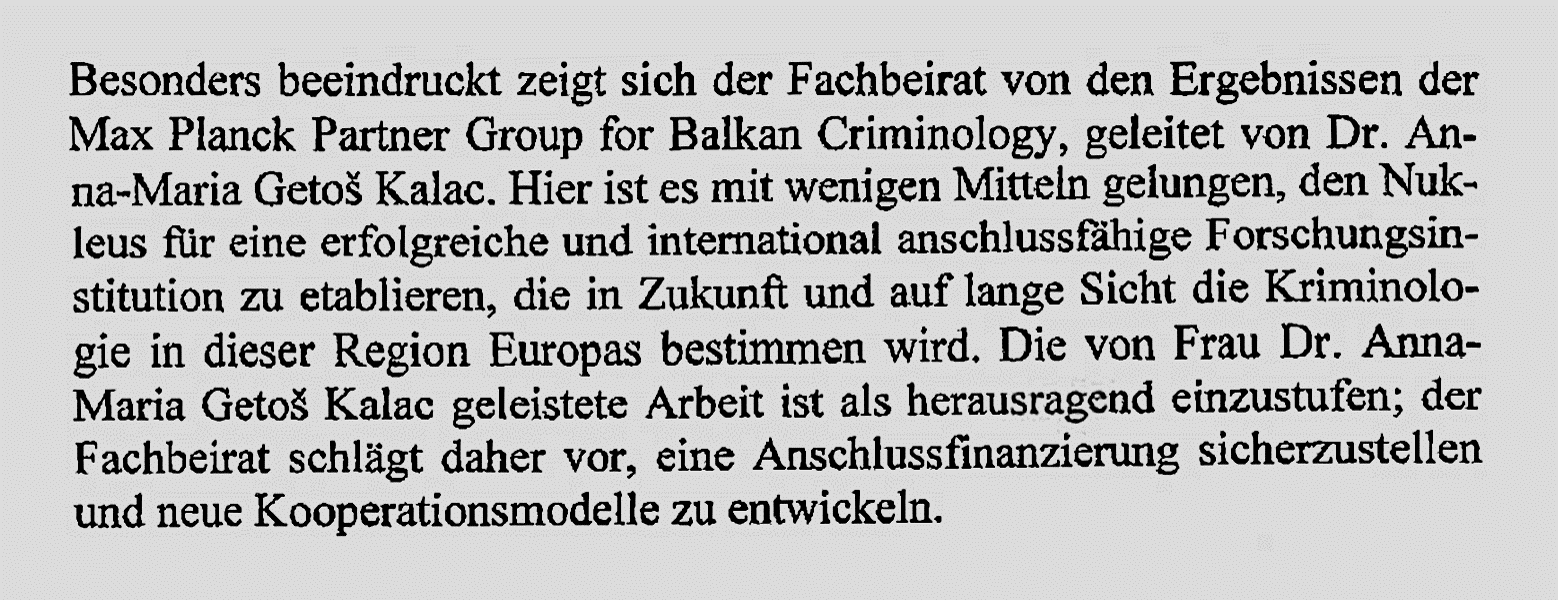Balkan Criminology success story
An excellent summary of the Balkan Criminology success story has been provided in early 2019 by the Scientific Advisory Board of the Max Planck Institute for Foreign and International Criminal Law in Freiburg/Germany (MPICC). After having evaluated Balkan Criminology’s research results and following a lively discussion with its Head, Prof. Dr. Anna-Maria Getoš Kalac, the Advisory Board in its MPICC Evaluation Report to the President of the Max Planck Society stated:
“The Advisory Board is particularly impressed with the accomplishments of the Max Planck Partner Group for Balkan Criminology, headed by Dr. Anna-Maria Getoš Kalac. With only scarce funds, the nucleus for a successful and internationally compatible research institution has been established. It will in the future and in the long run define criminology in this region of Europe. The work performed by Dr. Anna-Maria Getoš Kalac has to be rated as outstanding; therefore, the Advisory Board proposes to secure a follow-up financing and to develop new models of cooperation.”

From Research Concept to a Max Planck Partner Group
Balkan Criminology has proven to be not only a scientific, personal and professional success story of its Head Prof. Dr. Getoš Kalac, but also a success story of international research cooperation between the MPICC and the Zagreb Faculty of Law, and via the Balkan Criminology Network towards all states of Southeast Europe. Balkan Criminology is a pioneering effort to establish a centre of criminological and criminal justice excellence focused on Southeast Europe and the Balkan region. It was originally developed by Prof. Dr. Anna-Maria Getoš Kalac as a criminological research concept for Southeast Europe, and presented to the scientific community back in 2012 at the conference of the European Society of Criminology (ESC) in Bilbao/Spain. In early 2013 Balkan Criminology was entrenched at the Zagreb Faculty of Law as a Max Planck Partner Group together with the Max Planck Institute for Foreign and International Criminal Law, based on the decision of the President of the Max Planck Society – Germany’s most successful research organisation.

During the past 6 years Prof. Dr. Getoš Kalac and her team have conducted a total of 20 research projects, hosted or organised 5 conferences and 5 one-week intensive courses, held 15 panels at ESC conferences with a total of 65 BC presentations, issued 13 newsletters and by end-2019 will have published a total of 8 volumes in the BC book series (eds. H.-J. Albrecht & A.-M. Getoš Kalac). Balkan Criminology has thus generated 5 successful PhD projects, out of which 2 completed cotutelle PhDs between the Zagreb Faculty of Law (2015) and the MPICC, 1 completed PhD via the MPICC’s doctoral research school (2018), 1 submitted PhD by BC staff (2019), and 1 to soon be submitted PhD by BC ex-staff (2019).
From Research Group to a Partner of Global Players in Tackling Organised Crime
As of April 2019 the funding of Balkan Criminology by the Max Planck Society has been successfully concluded. The scientific and institutional nucleus that has been created during the past 6 years by Prof. Dr. Getos Kalac and her team will continue its operations at the Zagreb Faculty of Law, with the generous support of the Global Initiative against Transnational Organized Crime through its new global programme aimed at incubating resilience in communities harmed or threatened by criminal governance, the Resilience Fund.

Besides continuing its work and network activities with an even stronger focus on Balkan organised crime, Balkan Criminology will organise a one-week intensive course at the IUC in Dubrovnik in March 2020, particularly focusing on investigative journalism, civil society activism and their interlinkages with criminal justice agencies countering organised crime, in order to build resilience in local communities of the Balkans. The course will be held at the IUC in Dubrovnik from 23-27th March 2020. A limited amount of scholarships for funding attendance of professionals from the Balkan region is available. For more information se the 2020 Balkan Criminology Course on Organized Crime.
